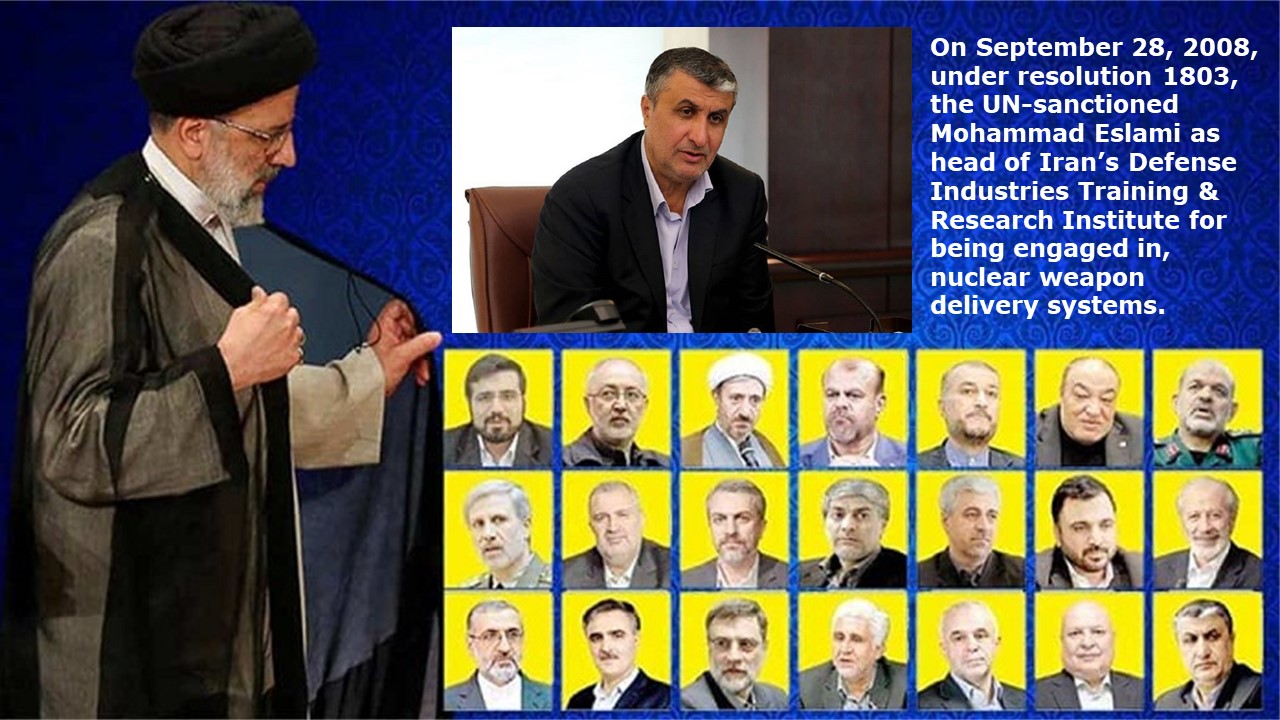
(PMOI / MEK Iran) and (NCRI): Mohammad Eslami, the new head of the regime’s Atomic Energy Organization was the principal liaison with Abdul Qadeer Khan to acquire knowledge of the atomic bomb.
According to the Iranian opposition group The National Council of Resistance of Iran (NCRI), and the People’s Mujahedin of Iran (PMOI / MEK Iran), the recent election of Ebrahim Raisi as President of Iran has a number of implications, not only for the Iranian people who have been oppressed for over 40 years, as well as for the world community and the rise of terrorism in Europe and the Middle East.
Terrorist operations and persecution of the people
Raisi made it a goal to incorporate in his government officials who had previously been involved in terrorist operations and persecution of the people.
The US blacklisted Mohammad Mokhber in 2016 as a result of his funding programs to oppress and seize the assets of Ayatollah’s regime dissidents, as well as for his chairmanship of EIKO (Execution of Imam Khomeini’s Order).
The regime’s nuclear director, Mohammad Eslami, negotiated with Pakistan’s nuclear specialist Abdul Qadir Khan and was sanctioned by the UN under Resolution 1803, based on his support for nuclear enrichment and efforts to acquire nuclear weapons delivery systems. He now oversees all uranium enrichment processes, some of which have now achieved 60 percent fissile purity, a critical technical step in the creation of an atomic weapon.
The bombing of the AMIA Jewish Community Center
Ahmad Vahidi was a significant figure in the bombing of the AMIA Jewish Community Center in Buenos Aires in 1994, which massacred 85 people. He was also in charge of the infamous Quds Force, whose members have been linked to international terror attacks.
Conciliatory interactions threaten to deepen nuclear operations fraudulently described by Tehran as civilian necessities when in reality they are appropriate for the pursuit of nuclear weapons and the development of international terrorism.
The failure of an attack in, France in 2018
After the failure of an attack on an international assembly of the Iranian Resistance in Villepinte, France in 2018, the regime’s dedication to such terrorism became clear. This episode also brought to light the dangers of Western reconciliation. Various political figures from throughout the world, as well as Iranian dissidents, attended the event. The foiled bomb plot resulted in the arrest of Assadollah Assadi, an Iranian terrorist diplomat, and three accomplices, all of whom were sentenced to 15 to 20 years in prison.
While the 2018 terror plan demonstrates the international implications of insufficient pressure on the regime and its new administration, the massacre of 1988, which killed about 30,000 dissidents, clearly depicts the potential consequences for Iran’s own population. Raisi, the new president, was one of the most powerful members of Tehran’s “Death Commission” at the time, overseeing executions in the Evin and Gohardasht prisons.
Assassinations of dissidents living abroad
There have been numerous assassinations of dissidents living abroad since then. Murders of government opponents were reported in various European nations between 1987 and 1993, according to the Public Prosecutor’s Office of the Canton of Vaud in Switzerland.
The international community should be concerned about the escalation of internal and external violence in Iran, as well as the acceleration of nuclear activities, and take action to counter the current trend of conciliation with the clerical regime, which is now led by a person responsible for one of the worst crimes since the establishment of the Khomeinist dictatorship.
MEK Iran (follow us on Twitter and Facebook)
and follow Maryam Rajavi’s on her site 
and follow NCRI (Twitter & Facebook) and People’s Mojahedin Organization of Iran – MEK IRAN – YouTube
